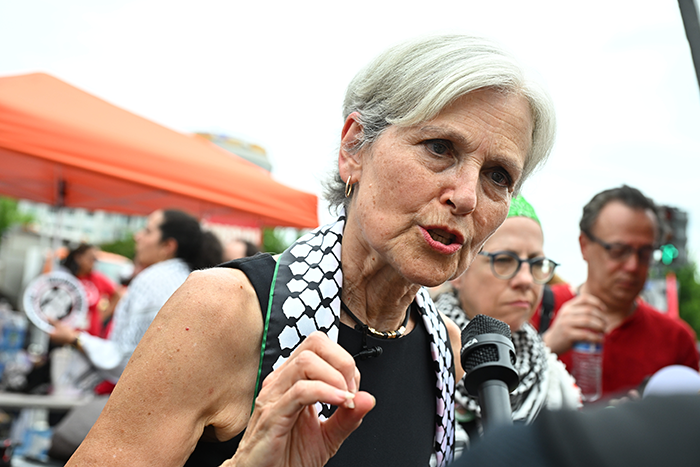New York Correspondences
7 October 2024
Jill Stein, the Green Party, and the Rejection of the Status Quo

On November 5, 2024, American voters will once again face a familiar choice: a duel between Democrats and Republicans. But in the margins of this polarized political landscape, a sense of dissatisfaction is growing. While Kamala Harris and Joe Biden are trying to consolidate the Democratic vote against a Republican opposition that capitalizes on economic fears and social tensions, a figure emerges to capture the frustration of a portion of the progressive electorate: Jill Stein, the Green Party candidate, is running for the third time in the U.S. presidential election.
Jill Stein, a trained physician and long-time activist, is no stranger to the political arena. A candidate in 2012 and 2016, she has consistently campaigned on progressive themes that resonate with an American left often marginalized by the major parties. Proposals like establishing universal healthcare, combating climate change, and advocating for a more peaceful foreign policy had previously attracted voters dissatisfied with traditional options. However, she has never truly managed to surpass the 1% mark in national votes.
Yet, this election could be different for the Green Party candidate. Why? Because it will take place in a context marked by deep divisions within the Democratic coalition, particularly over U.S. foreign policy in the Near and Middle East, and especially concerning the handling of the Israeli-Palestinian conflict. Since the start of Biden’s term, and more recently with his administration’s policy on Gaza, a portion of the American left feels betrayed. The U.S.’s near-unconditional support for Israel, coupled with intensive bombings of Gaza and the suffering of Palestinian civilians, has sparked strong indignation among progressives, particularly among younger voters and those from Arab and Muslim communities.
Could Stein capitalize on this rift within the Democratic Party to garner more votes than in her previous campaigns? It is a possibility that cannot be dismissed. Progressive movements have expressed their dissatisfaction with the Biden-Harris administration, accusing them of failing to offer a credible diplomatic solution for peace in the Near East while continuing to support increasingly controversial military actions. This resentment is reflected in polls, which show, in addition to a decline in support among young voters and ethnic minorities, an erosion of support among some traditional Democrats who voted for Biden in 2020.
Stein, with her resolutely pacifist stance and support for fair diplomacy, represents an alternative for these disillusioned voters. As the Green Party candidate, she openly criticizes U.S. policy in the Near East, calling for an immediate halt to military aid to Israel until it respects Palestinian human rights. This position, although marginal in the broader U.S. political landscape, is increasingly resonating among progressives who feel neither Biden nor Harris have adequately addressed critiques of their foreign policy.
However, will this be enough to turn this anger into votes? Recent history shows that third-party candidates, even when they present an attractive alternative, struggle to achieve significant results on the national stage. The U.S. political system, based on a first-past-the-post voting system in each state, offers little room for outsiders, unless they gain a massive base of voters in key states. Furthermore, even disillusioned Democrats may hesitate to vote for a third party, fearing it could lead to a Republican victory.
Nevertheless, if the 2024 election is as close as the 2020 race, even a small increase in Stein’s vote share could have an impact. Recent polls show a tight competition in battleground states like Pennsylvania, Michigan, and Georgia, where a few thousand votes could swing the outcome. In these states, if Stein manages to capture even a fraction of the progressive votes disillusioned with the current administration, it could not only boost the Green Party’s score but also disrupt the fragile balance between Democrats and Republicans.
Ultimately, Jill Stein has no realistic chance of winning the presidency. The electoral realities and structural obstacles make this nearly impossible. However, what’s at stake for her in 2024 is not so much victory, but the opportunity to make her message heard. By capitalizing on the weaknesses of the Biden-Harris administration, she could attract more attention than in her previous campaigns and steer the national debate toward issues like Gaza, climate, and social equity, which have thus far been sidelined in discussions between Democrats and Republicans.
The real challenge, then, is whether disillusioned voters will dare break with the status quo and express their frustration by voting for a candidate who, despite having no hope of victory in a deeply bipartisan system, could influence the dynamics between Kamala Harris and Donald Trump.
——————————–
Romuald Sciora directs the U.S. Political and Geostrategic Observatory at IRIS, where he is an associate researcher. A Franco-American essayist and political scientist, he is the author of numerous books, articles, and documentaries, and regularly appears in international media to comment on current events. He lives in New York.

